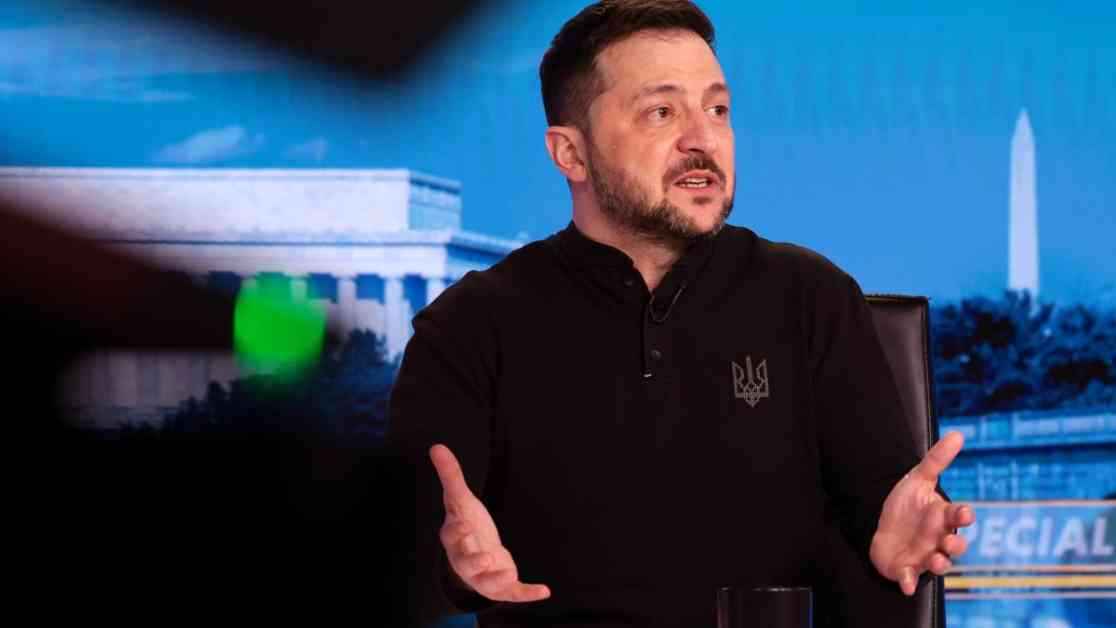Ukrainian President Volodymyr Zelenskyy made headlines after a heated exchange in the Oval Office with President Donald Trump and Vice President JD Vance. During a Fox News interview, Zelenskyy stood firm in his refusal to apologize for the clash, despite mounting pressure. His words were clear – “This kind of spat is not good for both sides.”
Zelenskyy’s unwavering stance sparked speculation and concern about the implications of strained diplomatic relations between the two nations. The Ukrainian leader expressed apprehension about the potential consequences of Trump discontinuing aid to Ukraine, highlighting the critical role that support from the United States plays in defending his country against Russian military forces.
In a candid moment, Zelenskyy acknowledged the invaluable assistance provided by Americans, expressing heartfelt gratitude for the aid that has sustained Ukraine through tumultuous times. He emphasized the significance of the ongoing support from President Trump and Congress, recognizing the pivotal role they have played in helping Ukraine navigate the challenges posed by Russian aggression.
The clash that unfolded at the White House shed light on the stark differences in perspectives between Zelenskyy and Vance regarding the path to peace with Russia. Zelenskyy’s impassioned rebuttal to Vance’s assertions underscored the deep-rooted tensions and complexities surrounding diplomatic relations with Russia, particularly in the aftermath of previous violations and broken agreements.
Vance’s criticism of Zelenskyy for not publicly acknowledging Trump further escalated the tensions, with Trump warning of dire consequences if a peace deal was not reached. The specter of “World War III” loomed large as Zelenskyy navigated the delicate balance of diplomatic negotiations, with the stakes higher than ever.
As the fallout from the clash reverberated, Zelenskyy’s decision to walk away from a planned deal underscored his commitment to securing guarantees of support from Trump in the event of Russian aggression. The unresolved tension between the two leaders cast a shadow over the prospects of a harmonious relationship, raising questions about the future trajectory of U.S.-Ukraine relations.
In his interview with Fox News, Zelenskyy expressed regret over the public nature of the dispute, emphasizing his desire for strong bilateral ties with the United States. Despite the challenges and missteps, he remained hopeful that the relationship with Trump could be salvaged, underscoring the importance of transparency and honesty in diplomatic engagements.
Trump’s dismissive comments following the clash further fueled speculation about the underlying dynamics at play, with European and NATO leaders rallying behind Ukraine in a show of solidarity. The resounding support from international allies signaled a collective commitment to bolstering Ukraine’s defense capabilities and ensuring its resilience in the face of external threats.
As the dust settled on the dramatic confrontation, the echoes of uncertainty lingered, with the broader implications of the clash reverberating across the global stage. The delicate dance of diplomacy between nations underscored the fragility of international relations and the imperative of maintaining open channels of communication to navigate challenging waters.
In the aftermath of the clash, Zelenskyy’s unwavering resolve and commitment to his country’s interests stood as a testament to his leadership and resilience in the face of adversity. The path forward remained uncertain, but the enduring spirit of cooperation and dialogue offered a glimmer of hope amid the shadows of discord and disagreement.
The unfolding saga of the U.S.-Ukraine clash served as a stark reminder of the complexities and challenges inherent in international diplomacy, underscoring the need for patience, understanding, and a shared commitment to forging a path toward peace and stability in an increasingly uncertain world.


